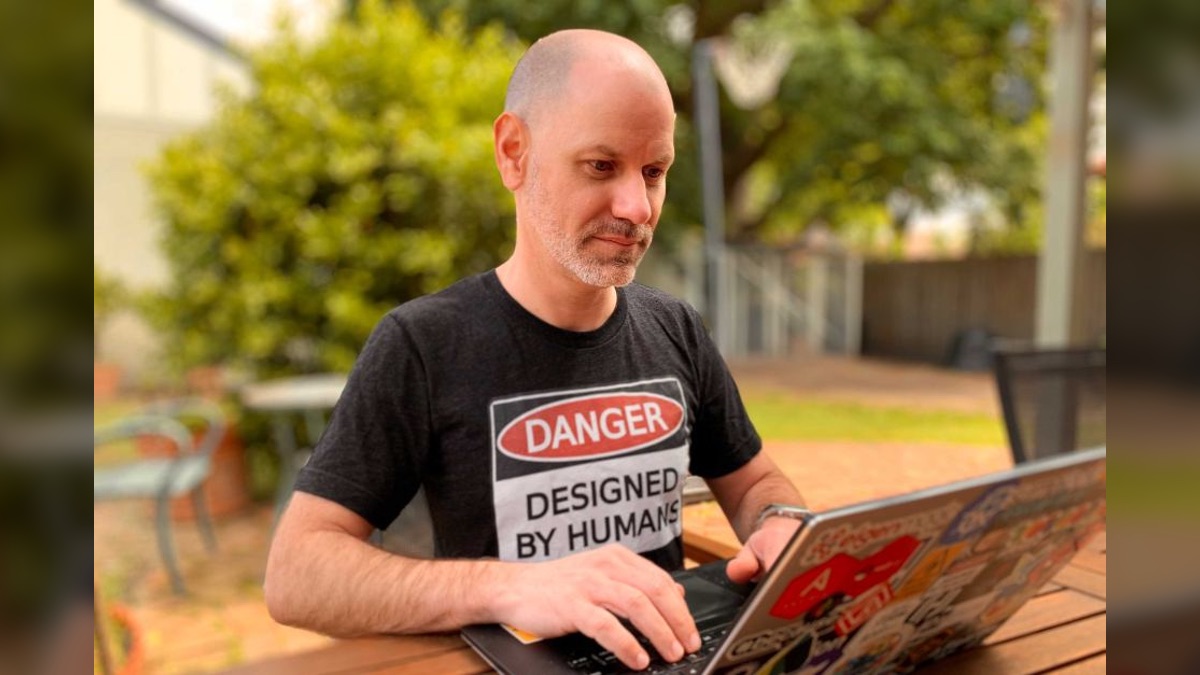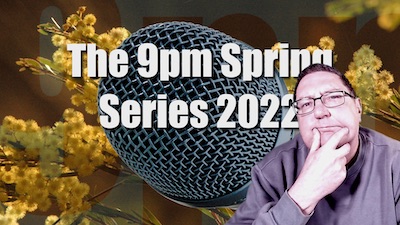
The winter series of The 9pm Edict continues with the return of Justin Warren, “consultant, freedom of information tragic, hexagon enthusiast, and creator of the CyberRating labelling scheme”. He’s also chair of Electronic Frontiers Australia, but I’m sure they’ll disown him.
In this episode we talk about the disaster that was the Australian government’s COVIDSafe app, as well the wonders of electricity, the kerfuffle about Instagram, the automation of journalism, why the concept of time is annoying, organisational culture, and necromancy.
This podcast is available on Amazon Music, Apple Podcasts, Castbox, Deezer, Google Podcasts, iHeartRadio, JioSaavn, Pocket Casts, Podcast Addict, Podchaser, Spotify, and Speaker.
You can also listen to the podcast below, or subscribe to the generic podcast feed.
Podcast: Play in new window | Download (Duration: 1:22:04 — 75.1MB)
Justin Warren has been on the Edict twice before.
Episode Links

-
CyberRating⢠pioneer, OopsRisk⢠evangelist, hexagon and FOI enthusiast, cheese noticer, digital rights advocate. Probably not a vampire. He/him.
-
My name is Justin Warren, and I live in Melbourne, Australia. Eigenmagic is my personal blog. Mostly itâs about technology and management, with a smattering of other topics thrown in for good measure. I write about whatever I think people might be interested in. I tend towards long form prose because I often donât have time to make things shorter.
-
This is where you buy your âDanger: Hexagonsâ warning signs and the like.
-
We specialise in marketing strategy, positioning, and messaging for technology companies, particularly startups. As a boutique firm, we offer custom consulting tailored to individual client needs, as well as a range of standard packages.
-
[26 June 2020, but the original TVC aired at least as early as April] To keep us all safe, and to help our health workers, it's vital to know quickly if you've come in contact with someone who has tested positive for coronavirus. Download COVIDSafe today.
-
[27 October 2020] Australia was urged to 'download' the app as the coronavirus pandemic took hold, but now it's been revealed advertising the COVIDsafe app has cost nearly $7 million in two months.
-
[10 August 2022] Users offered an update of app that âremoves functionality ⌠so no information is stored or collectedâ
-
[7 February 2022] We analysed data from all 619 COVID cases recorded in NSW above the age of 12 and their contacts between May and November 2020. We also interviewed contact tracers about whether they considered the app useful. Our analysis showed the app did not add much value to the existing, conventional contact tracing system.
-
Over 70 ways you can save.
-
The purpose of a system is what it does (POSIWID) is a systems thinking heuristic coined by Stafford Beer, who observed that there is âno point in claiming that the purpose of a system is to do what it constantly fails to do.â The term is widely used by systems theorists, and is generally invoked to counter the notion that the purpose of a system can be read from the intentions of those who design, operate, or promote it. When a system's side effects or unintended consequences reveal that its behavior is poorly understood, then the POSIWID perspective can balance political understandings of system behavior with a more straightforwardly descriptive view.
-
[4 August 2022] Industry policy for an age of opportunity.
-
Signalling System No. 7 (SS7) is a set of telephony signaling protocols developed in 1975, which is used to set up and tear down telephone calls in most parts of the world-wide public switched telephone network (PSTN). The protocol also performs number translation, local number portability, prepaid billing, Short Message Service (SMS), and other services.
-
[5 August 2022] If Earth were to shift to even longer days, we may need to incorporate a ânegative leap secondâ â this would be unprecedented, and may break the internet.
-
[1 March 2007] Maj. Gen. Don Sheppard (ret.): ââŚAt the international date line, whoops, all systems dumped and when I say all systems, I mean all systems, their navigation, part of their communications, their fuel systems. They were â they could have been in real trouble.
-
[21 November 2021] Vaguely-worded goals without measurable targets and a ragbag of existing initiatives don't make a plan, no matter how nice its colours are.
-
[6 October 2020] New is not new in Australia's federal Budget. Almost all of the cybersecurity spending is a re-announcement, and there are few measurable targets.
-
[28 April 2021] Only nine out of 1,713 times ACT police accessed location was fully compliant with laws, putting prosecutions at risk, Ombudsman says.
-
Exponential backoff is an algorithm that uses feedback to multiplicatively decrease the rate of some process, in order to gradually find an acceptable rate. These algorithms find usage in a wide range of systems and processes, with radio networks and computer networks being particularly notable.
-
The Triangle Shirtwaist Factory fire in the Greenwich Village neighborhood of Manhattan, New York City, on Saturday, March 25, 1911, was the deadliest industrial disaster in the history of the city, and one of the deadliest in U.S. history. The fire caused the deaths of 146 garment workers â 123 women and girls and 23 men â who died from the fire, smoke inhalation, or falling or jumping to their deaths. Most of the victims were recent Italian or Jewish immigrant women and girls aged 14 to 23; of the victims whose ages are known, the oldest victim was 43-year-old Providenza Panno, and the youngest were 14-year-olds Kate Leone and Rosaria "Sara" Maltese.
-
[10 August 2022] The federal government has scrapped the COVID-safe app. The app's efficacy was often called into question. The app's latest version asks users to uninstall it, as it is no longer being used for contact tracing. @BreakfastNews
-
BBC Series 'Locomotion'. Episode 1 of 6 (2003).
-
"Seeing Like a State: How Certain Schemes to Improve the Human Condition Have Failed" is a book by James C. Scott critical of a system of beliefs he calls high modernism, that centers on overconfidence in the ability to design and operate society in accordance with scientific laws. It was released in March 1998, with a paperback version in February 1999.
-
In Xinjiang, Chinas westernmost region, the Uyghur population operate on a different local time known as Xinjiang Time or ĂrĂźmqi Time. The unofficial time zone is much closer to solar time and only 6 hours ahead of UTC, meaning that the local time is 2 hours behind Bejing Time.
-
"Precision: The Measure of All Things" is a three-part British television series outlining aspects of the history of measurement. It was originally aired in June 2013 on BBC Four.
-
Western Europeans were among the first, if not the first, to invent mechanical clocks, geometrically precise maps, double-entry bookkeeping, precise algebraic and musical notations, and perspective painting. By the sixteenth century more people were thinking quantitatively in western Europe than in any other part of the world. The Measure of Reality, first published in 1997, discusses the epochal shift from qualitative to quantitative perception in Western Europe during the late Middle Ages and Renaissance. This shift made modern science, technology, business practice and bureaucracy possible.
-
A vacuum tube, electron tube, valve (British usage), or tube (North America), is a device that controls electric current flow in a high vacuum between electrodes to which an electric potential difference has been applied.
-
A Van de Graaff generator is an electrostatic generator which uses a moving belt to accumulate electric charge on a hollow metal globe on the top of an insulated column, creating very high electric potentials. It produces very high voltage direct current (DC) electricity at low current levels. It was invented by American physicist Robert J. Van de Graaff in 1929. The potential difference achieved by modern Van de Graaff generators can be as much as 5 megavolts. A tabletop version can produce on the order of 100 kV and can store enough energy to produce visible electric sparks. Small Van de Graaff machines are produced for entertainment, and for physics education to teach electrostatics; larger ones are displayed in some science museums.
-
A Tesla coil is an electrical resonant transformer circuit designed by inventor Nikola Tesla in 1891. It is used to produce high-voltage, low-current, high frequency alternating-current electricity. Tesla experimented with a number of different configurations consisting of two, or sometimes three, coupled resonant electric circuits.
-
[3 August 2022] A slew of new changes has drawn the ire of celebrities and regular users alike. But hating Instagram is nothing new.
-
[26 July 2022] Thereâs a lot happening on Instagram right now. I wanted to address a few things weâre working on to make Instagram a better experience. Please let me know what you think.
-
[10 August 2022] Motherboard has obtained court documents that show Facebook gave police a teenagerâs private chats about her abortion. Cops then used those chats to seize her phone and computer.
-
[3 August 2022] Researchers at Rice University in Texas have repurposed a body of a dead spider as a mechanical gripper, unsettling the internet
-
Rule 34 is an Internet maxim which asserts that Internet pornography exists concerning every conceivable topic. The concept is commonly depicted as fan art of normally non-erotic subjects engaging in sexual behavior.
-
In aesthetics, the uncanny valley (Japanese: ä¸ć°ĺłăŽč°ˇ bukimi no tani) is a hypothesized relation between an object's degree of resemblance to a human being and the emotional response to the object. The concept suggests that humanoid objects that imperfectly resemble actual human beings provoke uncanny or strangely familiar feelings of uneasiness and revulsion in observers. "Valley" denotes a dip in the human observer's affinity for the replica, a relation that otherwise increases with the replica's human likeness.
-
[28 August 2013] On Monday I delivered an updated version of my guest lecture at the University of Technology Sydney, âAlgorithms and the Filter Bubbleâ. And here it is.
-
"The Seven Basic Plots: Why We Tell Stories" is a 2004 book by Christopher Booker containing a Jung-influenced analysis of stories and their psychological meaning. Booker worked on the book for thirty-four years.
-
[5 August 2016] When Bart Jansenâs cat was hit by a car and he asked his friend whoâs an engineer if they could turn it into a drone. He came up with this idea from the simple fact he named the cat Orville after Orville Wright of the Wright Brother (who invented the first working airplane). They created an ostrich drone, rate drone, badger submarine and a shark jet.
-
August, 110 years ago. [The first mention fo the greenhouse effect.]
-
The Crux is a weekly newsletter about enterprise technology, cloud, and infosec. Every week we share a curated list of links to articles weâve read and think are worth your time, with a weekly tip from our analysts. As a bonus, we share the occasional long read that we suggest you sit down with when you have the time to really concentrate.
If the links aren’t showing up, try here.
Thank you, Media Freedom Citizenry
The 9pm Edict is supported by the generosity of its listeners. Please check out The 9pm Spring Series 2022 crowdfunding campaign to see how you can pledge your support in return for a variety of benefits, including TRIGGER WORDS, a CONVERSATION TOPIC, or even a custom-made audio or video message.
You have until 9pm AEST on Thursday 25 August. If you miss that deadline, you can always subscribe for special benefits or throw a few coins into the tip jar. Please consider.
This episode it’s thanks once again to all the generous people who contributed to The 9pm Winter Series 2022 crowdfunding campaign.
CONVERSATION TOPIC: Gay Rainbow Anarchist.
THREE TRIGGER WORDS: Craig Crompton, Crispin Harris, John Lindsay, Jonathan Ferguson, Peter Sandilands, Peter Viertel, Sheepie, Travis Smith, and one person who chooses to remain anonymous.
ONE TRIGGER WORD: Andrew Best, Bruce Hardie, Chris Rauchle, Dave Gaukroger, Frank Filippone, Gavin C, Joanna Forbes, Joop de Wit, Mark Newton, Matthew Moyle-Croft, Michael Cowley, Miriam Mulcahy, Nicole Coombe, Oliver Townshend, Paris Lord, Paul Williams, Peter Blakeley, Peter McCrudden, Peter Wickins, Ric Hayman, Rohan Tayler, Scott Reeves, Stacy Smith, Stephen Collins, Syl Mobile, and four people who choose to remain anonymous.
FOOT SOLDIERS FOR MEDIA FREEDOM who gave a SLIGHTLY LESS BASIC TIP: Andrew Duval, Andrew Kennedy, Benjamin Morgan, Bob Ogden, David Heath, Garry McKenzie, Garth Kidd, Garth Kidd (again), Garth Kidd (yet again, yes, for the third time), Iain Triffitt, Jamie Morrison, Jason Anderson, Jordan Wightman, Kimberley Heitman, Matt Arkell, Michael Strasser, Paul McGarry, Regina Huntington, Shane OâNeill, Tim Bell, Tony Barnes, and four people who choose to remain anonymous.
MEDIA FREEDOM CITIZENS who contributed a BASIC TIP: Brenton Realph, Elissa Harris, Mel, Raena, Ron Lowry, and one person who chooses to remain anonymous.
And another seven people chose to have no reward, even though some of them were the most generous of all. Thank you all so much.
Series Credits
- The 9pm Edict theme by mansardian via The Freesound Project.
- Edict fanfare by neonaeon, via The Freesound Project.
- Elephant Stamp theme by Joshua Mehlman.

